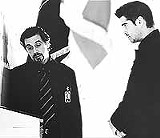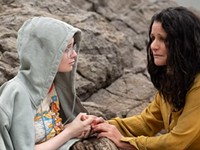The "unintelligence" community
[
{
"name": "500x250 Ad",
"insertPoint": "5",
"component": "15667920",
"parentWrapperClass": "",
"requiredCountToDisplay": "1"
}
]
Following a long and often instructive tradition, The Recruit demonstrates that popular film in general --- and the thriller, in particular --- provide an index to the characteristic tensions and attitudes of a particular time and place. Last year's retrograde and essentially obsolete thriller, The Bourne Identity, presented a familiar vision inherited from decades of shabby history: the CIA as a rogue agency, populated by thugs and assassins, happily willing to betray any person or any mission to accomplish its goals --- in that film, mostly the illegal acquisition of millions of dollars.
The Recruit, on the other hand, suggests a new CIA, an aggressive paramilitary organization staffed by dedicated individuals who sacrifice a great deal, sometimes even their lives, in the service of their country.
During its glory days fighting the Cold War, the CIA customarily recruited aristocratic Ivy Leaguers who spent most of their time, in between squash and sailing, funneling money to right-wing dissidents in leftist nations, propping up neo-Fascist dictatorships, destabilizing democratically elected governments, spying on American citizens, and, occasionally, betraying their own service. As for accomplishments, most of their most highly publicized triumphs turned out to be more hype than heroism, like the famous tunnel under the Berlin Wall, known from the beginning to the Soviets, who used it for purveying disinformation to the West. As for expertise, for example, after the terrorist attack on the World Trade Center, the agency admitted that none of its employees spoke Arabic.
In The Recruit, however, the protagonist, James Clayton (Colin Farrell), is a computer whiz who graduated first in his class at M.I.T. He also possesses the necessary strength and athleticism to endure a grueling training period that resembles a combination of Marine boot camp and the Spanish Inquisition. On top of that, he even understands the conversation of two fellow recruits chatting in Farsi.
Al Pacino plays his supervisor and mentor, Walter Burke, whose reiterated dicta govern all the action of the movie: "Everything is a test," and "Nothing is what it seems." Although its plot relies on a series of deceptions in which Burke constantly outwits Clayton (and the audience), in fact, the picture reveals its ending in the opening sequence, which, in effect, shows the methods that will help the young recruit succeed.
One of the most striking oddities of the movie involves its temporal context. It takes place in a time when the American public happily consents to the federal government's theft of their liberty and privacy, which inevitably turns organizations like the CIA into a band of heroes. Nowhere in the picture, tellingly, does anyone actually cite patriotism in any form as a motive for joining the CIA, and Burke loudly mocks the salary, perks, and rewards of service. His only motivation seems to be a love of adventure and a selfless desire to be a hero. The trainers and teachers of the recruits never specify an enemy, and when the most obvious traitor in the film acknowledges his treachery, he names the sum he will receive, but not its source. It all makes one yearn for the Cold War, when the CIA, FBI, and NSA agents took their money and ran to Moscow.
Handsome, fit, sporting a fashionable, three-days growth of beard he maintains throughout the picture, Farrell (one of Hollywood's hot new stars) manages his part with a modicum of competence. He looks properly scared and puzzled most of the time; but can hardly compete with Pacino when they both occupy the same frame. Still, he mostly holds his own.
Although he's been better in better movies, Pacino simply dominates his scenes, using some harsh inflection of that hoarse voice, a sidelong look, a wiseguy smirk --- always allowing a sardonic humor to filter into even his most serious moments. When he manipulates Farrell and the other recruits throughout the film, we believe in his sincerity as a teacher. But we also accept the fact that he rather enjoys being mean to his students, all the while reminding them that he only cares about their welfare. Pacino manages the tricky task of balancing his charismatic presence with an instinct for the sinister.
The most wonderfully complex moment in the whole movie, an establishing shot of the actual sign marking the CIA's headquarters, both epitomizes and, apparently inadvertently, satirizes the action, themes, and setting of The Recruit with an irony rare in cinema or even in literature. Without a parenthetical remark, an exclamation point, or any sort of wink or nudge from the filmmakers, the shot shows a large green sign, reading in clear white lettering: "George Bush Center for Intelligence." Memorializing the first Bush (who was fleetingly head of the CIA), reminding us of the aristocratic traditions of the organization, and stating one of the great impossibilities of our time for both father and son, the shot also pretty much informs us of just what sort of pickle we are all in. God help us.
The Recruit, starring Al Pacino, Colin Farrell, Bridget Moynahan, Gabriel Macht, Mike Realba, Dom Fiore, Karl Pruner; written by Roger Towne, Kurt Wimmer, and Mitch Glazer; directed by Roger Donaldson. Cinemark Tinseltown; Hoyts Greece Ridge; Loews Webster; Pittsford Plaza Cinema; Regal Culver Ridge; Regal Eastview; Regal Henrietta.
You can hear George and his movie reviews on WXXI-FM 91.5 Fridays at 7:15 a.m., rerun on Saturdays at 11:15 a.m.




